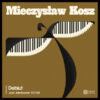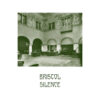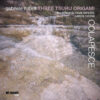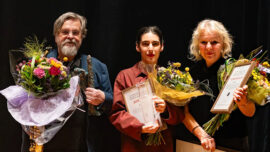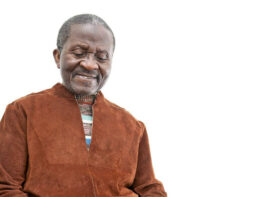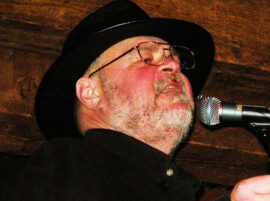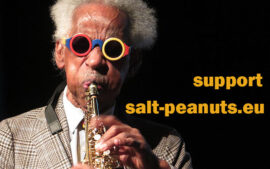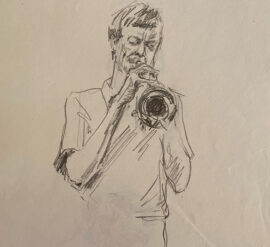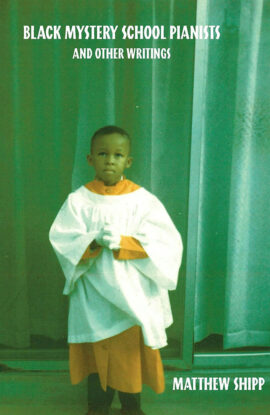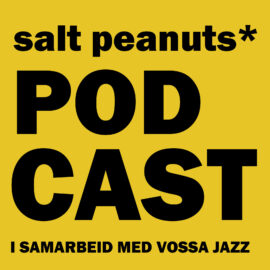
I don’t know. What I know is: the album’s music is a fest, a fest of bright colors, inner fire, broad and hidden smiles, cool coherent gestures, strong attacks, laid-back strolling, fiery rocket-rides, elegantly crossing swords and traces of vintage flags from Manhattan, Vienna, Tokyo and Paris.
Aki Takase is the goddess of black and red thunder, la grande dame of unique style and a transfiguring cabaretesque silhouette. Through her long career she again and again has coalesced heterogeneous and also seemingly opposing elements to a striking unified and grounded whole. She did that as a strong leader or a coequal partner in duos with the likes of Maria João, David Murray or Han Bennink. She was the musician par excellence having solid grip on this kind of strong fellow musicians and at the same time enabled free flourishing in common.
Daniel Erdmann is the elegantly into the horn’s line bent figure keen on evoking striking melodic flags, rich themes as well as its rousing, roaring, splattering fringes. He has formed remarkable capacities to combine and merge the presently available techniques in service of a clear shaping of expression into its carrying and effective force. He has developed and consolidated these in the heat of the Berlin scene, in international groups and during a longer period now also as clearly visible part of the French scene. Both musicians are border crossers without fuss, sans trop de chichi, ōsawagi sezu ni.
The album is a marked, almost inevitable meeting of kindred spirits from the jazz universe bridging the experiences of different generations, and bringing their energies next to each other, get it together and let it flow independently, creatively responsive and congruently through thirteen pieces, pieces unified by sharp form awareness, cool, witty, imaginative playfulness, and attractive framing right from the middle of joy inspired by noticeable as well as unnoticed ancestor on board as pianist James P. Johnson and some of the great classic tenor saxophonists. But watch out, Erdmann plays soprano just as often on this album.
This cumulation of qualities found its recognition in three high German awards recently: Aki Takase received the (annual) New German Jazz Award in the category ‘piano’ and Daniel Erdmann in the category ‘woodwind instruments’. Daniel Erdmann also received the «old» dignified annual German SWR Jazz Award for 2020, a price once initiated by Joachim E. Behrendt in the 80s of the last century.
The Takase-Erdmann duo-configuration doesn’t come out of the blue. It is just an evident next step after their collaboration in Takase’s quartet Japanic (with Erdmann (sax), Johannes Fink (b), Dag Magnus Narvesen (dr) and DJ Illvibe (turntables, electr)). Except the title-piece, the 55-minute album consists of originals, one half by Takase, the other half by Erdmann.
«Sans sulfites» is translucent, crossfading along echoes of James P. Johnson (1894-1955) and Thelonius Monk (1917-1982). Erdmann’s broad tenor with its sharp edges forcefully sets the tone. «Festa Magdalena» has a gorgeous melody as point of departure, a great basis for wild excursions. «Voodoo Girl» comes with pounding hammer blows and whirls things up. «Good Bucket Quick Step» has an extraordinary, memorable sax intro leading into splendid interactions. «Elevation» charms by its wonderful Strayhorn touch, reminiscing of «Isfahan». It unfolds in a rich and generous way with Erdmann’s excellent tone on sax! «No Particular Night or Morning» is a light-footed Monk-inspired piece. «An jeder Kreuzung liegt eine Erinnerung begraben» is a zigzagging stop-and-go affair and «Magic», a circle dance reminds of Mal Waldron’s «Macedonian Fertility Dance». It offers plenty possibilities to play around with sloping and tilting layers. Takase and Erdmann make use of it in amazingly resourceful, exact and responsive way. «A Small Step For Me» then reveals as a calmly breathing piece with a greatly celebrated motif. «Reconstruction in Berlin» is a hilarious humpty-dumpty thing, a Buster Keaton slap stick tour of dancing fish and «The Cat» is another melodic musical fun piece. «Pascale», an embracing hymn, starts with heightening the tension by marvelously alternating freezing and de-freezing steps. Finally, it derails with relish – the art of successfully stray from the path – and results into a wild stamping outburst.
«Isn’t It Romantic?» is the only standard here, again one by the great, indispensable Richard Rogers. Yes, there is a light breeze of relaxed cool nostalgia now and then here, providing upswing to further high flights to come.
Henning Bolte
Aki Takase (p), Daniel Erdmann (ts, ss)

